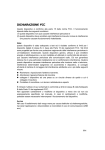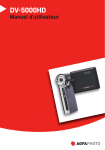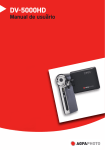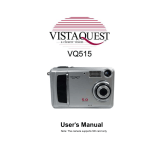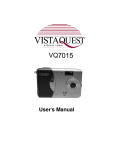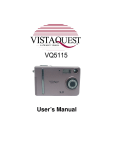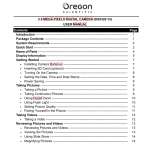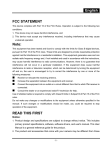Download AgfaPhoto HD-DV Camcorder User manual
Transcript
DV-5000HD User manual FCC STATEMENT This device complies with Part 15 of the FCC Rules. Operation is subject to the following two conditions: (1) This device may not cause harmful interference, and (2) This device must accept any interference received, including interference that may cause undesired operation. Note: This equipment has been tested and found to comply with the limits for Class B digital devices, pursuant to Part 15 of the FCC rules. These limits are designed to provide reasonable protection against harmful interference in a residential installation.This equipment generates uses and can radiate radio frequency energy and, if not installed and used in accordance with the instructions, may cause harmful interference to radio communications. However, there is no guarantee that interference will not occur in a particular installation. If this equipment does cause harmful interference to radio or television reception, which can be determined by turning the equipment off and on, the user is encouraged to try to correct the interference by one or more of the following measures: Reorient or relocate the receiving antenna. Increase the separation between the equipment and receiver. Connect the equipment into an outlet on a circuit different from that to which the receiver is connected. Consult the dealer or an experienced radio/TV technician for help. Use of shielded cable is required to comply with Class B limits in Subpart B of Part 15 of the FCC rules. Do not make any changes or modifications to the equipment unless otherwise specified in the manual. If such changes or modifications should be made, you could be required to stop operation of the equipment. Notice If static electricity or electromagnetism causes data transfer to discontinue midway (fail), restart the application or disconnect and connect the communication cable (USB, etc.) again. EN-1 READ THIS FIRST Trademark Information Microsoft® and Windows® are U.S. registered trademarks of Microsoft Corporation. Pentium® is a registered trademark of Intel Corporation. Macintosh is a trademark of Apple Computer, Inc. SD™ is a trademark. Other names and products may be trademarks or registered trademarks of their respective owners. Product Information Product design and specifications are subject to change without notice. This includes primary product specifications, software, software drivers, and user’s manual. This User Manual is a general reference guide for the product. The manufacturer assumes no liability for any errors or discrepancies in this user manual. EN-2 SAFETY INSTRUCTIONS Read and understand all Warnings and Cautions before using this product. Warnings If foreign objects or water have entered the video camera, turn the power off and remove the batteries. Continued use might cause fire or electric shock. Consult the store of purchase. If the video camera has fallen or its case has been damaged, turn the power off and remove the batteries. Continued use might cause fire or electric shock. Consult the store of purchase. Do not disassemble, change or repair the video camera. This might cause fire or electric shock. For repair or internal inspection, ask the store of purchase. Do not use the video camera in areas near water. This might cause fire or electric shock. Take special care during rain, snow, on the beach, or near the shore. Do not place the video camera on inclined or unstable surfaces. This might cause the video camera to fall or tilt over, causing damage. Keep the batteries out of the reach of children. Swallowing the batteries might cause poisoning. If the batteries are accidentally swallowed, immediately consult a physician. Do not use the video camera while you are walking, driving or riding a motorcycle. This might cause you to fall over or result in traffic accident. Please use batteries with complete external seals. Do not use batteries from which the seals have been damaged or removed.This may cause leakage, explosion, or injury. EN-3 Cautions Load the batteries paying careful attention to the polarity (+ or –) of the terminals. Loading the batteries with their polarities inverted might cause fire and injury, or damage to the surrounding areas due to the battery rupturing or leaking. Do not flash the LED lights close to anyone’s eyes. This might cause damage to the person’s eyesight. Do not subject the LCD monitor to impact. This might damage the glass on the screen or cause the internal fluid to leak. If the internal fluid enters your eyes or comes into contact with your body or clothes, rinse with fresh water. If the internal fluid has entered your eyes, consult a physician to receive treatment. A video camera is a precision instrument. Do not drop it, strike it or use excessive force when handling the video camera. This might cause damage to the video camera. Do not use the video camera in humid, steamy, smoky, or dusty places. This might cause fire or electric shock. Do not remove the batteries immediately after long period of continuous use. The batteries become hot during use. Touching a hot battery might cause burns. Do not wrap the video camera or place it in cloth or blankets. This might cause heat to build up and deform the case, resulting in fire. Use the video camera in a well-ventilated place. Do not leave the video camera in places where the temperature may rise significantly, such as inside a car. This might adversely affect the case or the parts inside, resulting in fire. Before you move the video camera, disconnect cords and cables. Failure to do this might damage cords and cables, resulting in fire and electric shock. EN-4 Notes on Battery Usage When you use the batteries, carefully read and strictly observe the Safety Instructions and the notes described below: Use only the specified batteries. (AA batteries) Avoid extremely cold environments as low temperatures can shorten the battery life and reduce video camera performance. Therefore Ni-MH rechargeable batteries are highly recommended. When you are using a new rechargeable batteries or rechargeable batteries that have not been used for an extended period of time (the batteries that passed the expiry date are exception), it may affect the number of images that can be captured. Therefore, to maximize their performance and lifetime, we recommend that you fully charge the batteries and discharge them for at least one complete cycle before use. The batteries may feel warm after a long period of continuous use of the video camera. This is normal and not a malfunction. The video camera may feel warm after a long period of continuous use. This is normal and not a malfunction. If the batteries are not to be used for a long period of time, remove them from the video camera to prevent leakage or corrosion and store them after no battery power is left. Stored for a long time in a fully charged condition, their performance may be impaired. Always keep the battery terminals clean. There is a risk of explosion if the batteries are replaced by an incorrect type. Dispose of used batteries according to the recycle instructions. Charge the rechargeable batteries fully before using for the first time. Never use batteries of different types (together) or mix old and new batteries. Never use manganese batteries. To prevent short-circuiting or fire, keep the batteries away from other metal objects when carrying or storing. EN-5 CONTENTS 7 INTRODUCTION 29 MENU OPTIONS 7 7 Overview Package Contents 8 GETTING TO KNOW YOUR DIGITAL VIDEO CAMERA 29 31 33 34 8 Front View 9 Rear View 10 LCD Monitor Display 14 GETTING STARTED 14 15 15 16 17 17 18 Preparation Turning the Power On/Off LED Indicators Handling the Digital Video Camera Setting the Date and Time Choosing the Language Formatting the Memory Card 19 CAPTURE MODE 19 19 20 20 21 Recording Video Clips Capturing Still Images Using the Zoom Function Setting the Focus Setting the Self-Timer 22 PLAYBACK MODE 22 Playing Back Video Clips 23 Playing Back Still Images 24 Playing Back Still Images/Video Clips on TV 24 Connecting the digital video camera to HDTV 25 Thumbnail Display 26 Slide Show Display 26 Delete File 27 Protecting Images 28 AUDIO MODE 28 Recording Audio Files 28 Playing Back Audio Files EN-6 Video Menu Capture Menu Playback Menu Setup Menu 36 INSTALLING SOFTWARE PROGRAM 37 TRANSFERRING FILES TO YOUR COMPUTER 37 Downloading / Deleting Your Files via Computer 38 SPECIFICATIONS 39 APPENDIX 39 Troubleshooting 40 Customer Care 41 WEEE Statement INTRODUCTION Overview Thank you for purchasing this AgfaPhoto digital camera. Please read these operating instructions carefully in order to use the digital camera correctly. Keep the instructions in a safe place after reading so that you can refer to them later. Package Contents Carefully unpack your digital video camera and ensure that you have the following items: Common Product Components: AgfaPhoto DV-5000HD CD-ROM USB cable AV cable YPbPr (HD out) cable Camera strap Camera pouch 2 x AA size batteries EN-7 GETTING TO KNOW YOUR DIGITAL VIDEO CAMERA Front View 1 2 3 4 5 7 6 1. Speaker 2. Focus switch Normal mode Macro mode 3. Lens 4. LED lights 5. Microphone 6. Battery cover 7. Tripod socket EN-8 Rear View 1 2 3 4 5 6 7 8 9 10 11 12 13 14 1. LCD monitor 2. Power button 3. W Left button Self-timer button 4. / Zoom out (wide-angle) button / Thumbnail button / Zoom in (telephoto) button 5. S Up button MODE Mode button 6. X Right button Camera mode quick key 7. OK/Shutter button 8. T Down button MENU Menu button 9. Status LED indicator 10. USB port 11. SD/SDHC memory card slot 12. AV OUT1 terminal 13. AV OUT2 (HD OUT) terminal 14. Strap holder EN-9 LCD Monitor Display Standby Mode Video Mode 1. Video mode icon 2. Available recording time 3. Storage media [ ] SD/SDHC memory card 4. Battery condition [ ] Full battery power [ ] Medium battery power [ ] Low battery power [ ] No battery power 5. Zoom status bar 6. Exposure compensation 7. White Balance [ ] Auto [ ] Daylight [ ] Tungsten [ ] Fluoresc.1 [ ] Fluoresc.2 [ ] Cloudy 8. Image quality [ ] Fine [ ] Standard [ ] Economy 9. Video size [ ]1280 x 720 [ ]720 x 480 [ ]352 x 240 10. Focus setting [Blank] Normal [ ] Macro 11. Self-timer [ 10s] 10 sec. [ 2s] 2 sec. EN-10 1 2 3 4 00:02:05 10s 11 10 9 8 7 6 5 Camera Mode 1. Camera mode icon 2. Available number of shots 3. Storage media 4. Battery condition 5. Zoom status bar 6. Capture mode icon [Blank] Single 13 [ ] Burst [ ] AEB 7. ISO [ ] Auto [ ] 50 [ ] 100 [ ] 200 [ ] 400 8. Exposure compensation 9. White Balance 10. Image quality 11. Image size [8m]3264 x 2448 (FW interpolation) [5m]2560 x 1920 [3m]2048 x 1536 [1m]1280 x 960 [0.3m]640 x 480 12. Focus setting 13. Self-timer 1 2 3 4 9999 5 10s 5m 12 11 10 9 8 7 6 EN-11 Audio Recording Mode (Standby) 1. 2. 3. 4. 5. 6. 7. Audio mode icon Available recording time Storage media Battery condition Elapsed time Recording indicator Status indicator 1 2 3 00:25:00 00:00:00 7 6 REC (Recording) 00:03:06 Stop EN-12 4 5 Playback Mode Video Mode 1. 2. 3. 4. 5. 6. 7. 8. Playback mode icon Elapsed time Storage media Battery condition Folder and file number Volume indicator Video status bar Playback indicator 1 2 3 4 00:00:00 8 Pause Stop 101-0001 7 Camera Mode 1. 2. 3. 4. 5 6 1 2 3 Playback mode icon Storage media Battery condition Folder and file number 101-0001 4 Audio Playback Mode 1. 2. 3. 4. 5. 6. Playback mode icon Elapsed time Storage media Battery condition Volume indicator Folder and file number (ex. 100-0011) 7. Stop indicator 8. Playback indicator 9. Audio status bar 1 2 3 4 00:00:00 9 5 Pause 8 Stop 100-0011 7 6 EN-13 GETTING STARTED Preparation 1. Attach the camera strap. 2. Open the battery cover. 3. Insert the supplied batteries with correct orientation as shown. 4. Insert an SD/SDHC memory card. Be sure to format the SD/SDHC memory card with this video camera before its initial usage. Close the battery cover and make sure it is locked securely. To prevent valuable data from being accidentally deleted from an SD/ SDHC memory card, you can slide the write protect tab (on the side of the SD/SDHC memory card) to “LOCK”. To save, edit, or delete data on an SD/SDHC memory card, you must unlock the card. To prevent damaging of SD/SDHC memory card, be sure to turn off the power when inserting or removing the SD/SDHC memory card. If inserting or removing the SD/SDHC memory card with the power on, the digital video camera will automatically turn off. Be careful not to drop the batteries when opening or closing the battery cover. EN-14 Turning the Power On/Off Load the batteries and insert an SD/SDHC memory card before starting. Press the button until the digital video camera turns on. To turn the power off, press the button again. The power is turned off automatically when the digital video camera has not been operated for a defined period of time. To resume operation, turn the power on again. Refer to section in this manual titled “Power Off” in the Setup Menu for further details. LED Indicators Indicators State Description/Activity LED indicator Solid green The digital video camera is powering up. LED indicator Solid green The digital video camera is ready to record images (or videos). LED indicator Solid green USB communication/transfer is in progress. LED indicator Blinking green Reading/Writing files. EN-15 Handling the Digital Video Camera 1.Open the panel by pulling it away from the digital video camera. 2.Choose the angle of the monitor that suits you best by rotating the panel. Make sure you open the LCD panel at 90 degrees before attempting to rotate it. Rotate the LCD panel carefully with the correct direction. Over rotation or rotating to the wrong direction may damage the hinge that connects the LCD monitor to the digital video camera. Avoid touching the LCD monitor when moving the LCD panel. Cautions: Do not hold the digital video camera by only holding the LCD panel. Be careful not to block the lens, microphone, or LED lights with your fingers when shooting. Close the LCD panel when not using the digital video camera to avoid damages. EN-16 Setting the Date and Time The date/time needs to be set if/when: The digital video camera is turned on for the first time. The digital video camera is turned on after being left without batteries for an extended period of time. 1. Press the button until the digital video camera turns on. 2. Press the MENU button. 3. Select [Setup] with the f button. 4. Select [Date/Time] with the c / d buttons, and press the button. Select the item’s field with the e / f buttons and adjust the value for the date and time with the c / d buttons. The time is displayed in 24-hour format. After confirming all settings are correct, press the button. 5. To exit from the [Setup] menu, press the f button. Setup Language Format LCD Bright. Light Freq. Date / Time English Next Menu 0 50Hz Next Menu : Exit : OK Date / Time 2008.01.01 00:00 Y/M/D : OK Choosing the Language Specify in which language menus and messages are to be displayed on the LCD monitor. 1. Press the MENU button. 2. Select [Setup] menu with the f button. 3. Select [Language] with the c / d buttons, and press the button. The Language setting screen will be displayed. 4. Select the displayed language with the c / d buttons, and press the button. The setting will be stored. Setup Language Format LCD Bright. Light Freq. Date / Time : Exit English Next Menu 0 50Hz Next Menu : OK EN-17 Formatting the Memory Card This utility formats the SD/SDHC memory card and deletes all stored images, video clips, and data. 1. Press the MENU button. 2. Select [Setup] menu with the f button. 3. Select [Format] with the c / d buttons, and press the button. 4. Select [Yes] with the c / d buttons, and press the button. To cancel formatting, select [No] and press the button. Setup English Language Format Next Menu LCD Bright. Light Freq. Date / Time 0 50Hz Next Menu : Exit : OK Format Format Card? No Yes : Exit EN-18 : OK CAPTURE MODE Your digital video camera is equipped with a 2.36" TFT-LCD monitor to help you capture/playback images and video clips or adjust menu settings. Recording Video Clips 1. Press the button until the digital video camera turns on. The default mode is Video Mode. 2. Compose the image on the LCD monitor. 3. Press the button to start recording. 4. Press the button again to stop recording. The recording time depends on the storage media size and the subject to be recorded. 00:02:05 10s Capturing Still Images 1. Press the button until the digital video camera turns on. 2. Press the MODE button or button (camera mode quick key) to enter Capture Mode. 3. Compose the image on the LCD monitor. 4. Press the button to capture the image. 9999 10s 5m If the access speed of your SD/SDHC memory card is not fast enough for recording video clips in the currently selected size, the recording will stop. In this case, select a video quality lower than the current one. EN-19 Using the Zoom Function This digital video camera is equipped with digital zoom. You may enlarge the subjects by pressing the button. While digital zoom can be a useful feature, the more an image is enlarged (zoomed), the more pixelated (grainier) the image will appear. To capture a zoomed image/video clip, perform the following steps: 1. Compose the image on the LCD monitor. Press the button to zoom in on the subject, and enlarge the subject on the LCD monitor. Press the button to view a wider angle of the image. The status of digital magnification is displayed on the zoom status bar. 2. Press the button to capture the image/ video clip. The zoom function may be activated as you record video clips. Setting the Focus Images/Video clips may be captured by sliding the focus switch to set the focus modes: [ ] macro or [ ] normal mode. 1. Slide the focus switch to your desired focus mode. 2. Compose the image on the LCD monitor 3. Press the button to capture the image/ video clip. Focus mode Description Normal This mode is suitable for scenery and portrait shooting. Macro Select macro to capture close-up images. When the lens is zoomed to its widest position you may focus objects as close as 60 cm. EN-20 Setting the Self-Timer The self-timer may be used in situations such as group shots. When using this option, you should either mount the digital video camera on a tripod (recommended) or place it on a flat, level surface. 1. Press the button to select the self-timer setting. 2. Compose the image on the LCD monitor and press the button. The self-timer function is activated and begins to count down. 3. The image/video clip is captured after the preset time has elapsed. Self-timer mode Description 2s The image is captured about 2 seconds after the shutter is pressed. This mode is useful for preventing camera shake. 10s The image is captured about 10 seconds after the shutter is pressed. This mode is suitable for the shots in which the photographer has to be included. After one image/video clip is taken, the self-timer mode is turned off. If you wish to take another shot using the self-timer, repeat the above steps. EN-21 PLAYBACK MODE Playing Back Video Clips 1. Press the MODE button until is displayed. The last recorded image/video clip appears on the LCD monitor. 2. Select the desired video clip with the e / f buttons. 3. Press the button to start video playback. To pause video playback, press the button. To cancel pause, press the button again. 4. To stop video playback, press the d button and return to the start of the video clip. 00:00:00 Pause Stop 101-0001 Video clips cannot be displayed rotated or enlarged. To play back video clips on your computer, you may use Windows Media Player 9 with additional H.264 Codec (H.264 Codec is free on the Internet) or Quick Time basic player (7.0 or above version). QuickTime basic player is available free of charge, compatible with Mac and Windows-computers and can be downloaded from the Apple web site at www.apple.com. For helps on using QuickTime Player, please refer to the QuickTime on-line help for more information. EN-22 Playing Back Still Images 1. Press the MODE button until is displayed. The last recorded image/video clip appears on the LCD monitor. 2. Select the desired image with the e / f buttons. 3. The images can be displayed in reverse or forward sequence with the e / f buttons. 4. Press the / button to adjust the zoom ratio. The magnification factor is displayed on the LCD monitor. 5. To view different portion of the images, press the c / d / e / f button to adjust the display area. 2X 100-0011 EN-23 Playing Back Still Images/Video Clips on TV You can also playback your images on a TV screen. Before connecting to any devices, make sure to select NTSC / PAL system to match the video output system of the video equipment you are going to connect to the digital video camera, then turn all connected devices off. 1. Connect one end of the AV cable to the AV OUT1 terminal of the digital video camera. 2. Connect the other end to the AV input socket of the TV set. 3. Turn the TV and digital video camera on. 4. Playback the still images/video clips. 5. The method of operation is the same as playing back still images and video clips on the digital video camera. Connecting the digital video camera to HDTV HD TV (High Definition Television) is a digital television broadcasting system with better resolution than traditional television systems. It can perform HD (720P) high resolution quality. HD TV Video IN (green) (green) (blue) (blue) (red) (red) (red) (red) AV OUT1 Audio IN (white) (white) <AV cable> (yellow) AV OUT2 (HD OUT) (Do not connect in Yellow Cable) <YPbPr(HD out) cable> 1. Connect one end of the YPbPr (HD out) cable into the (Video IN) port on the HDTV and the other end into the AV OUT2 (HD out) terminal of the digital video camera. 2. Connect one end of the AV cable into the (Audio IN) socket of the HDTV and the other end into the (AV OUT1) terminal of the digital video camera. (Do not connect the yellow connector to HDTV’s AV-IN.) 3. Turn the TV and digital video camera on. The video camera will auto detect and set the settings when the cables are connected. EN-24 Thumbnail Display This function allows you to view 6 thumbnail images on the LCD monitor simultaneously so you may search for a particular image/video clip. 1. Press the MODE button until is displayed. 2. Press the / button. 6 thumbnail images are displayed simultaneously. 3. Use the c / d / e / f buttons to move the cursor to select the image to be displayed at regular size. 4. Press the button to display the selected image on full screen. Protect icon Audio file Still image Movie clip OK 100-0003 00:03:02 EN-25 Slide Show Display The slideshow function enables you to play back your still images automatically in sequential order as a slideshow. This is a very useful and entertaining feature for reviewing captured images and for presentations. 1. Press the MODE button until is displayed. 2. Press the MENU button. 3. Select [Slide Show] with the c / d buttons and press the button. 4. Select the desired interval time with the c / d buttons, and press the button. The slide show starts. To stop the slideshow during playback, press the T button. Play Slide Show Delete File Next Menu Delete All Protect Sound Next Menu Single No 5 : Exit : OK Slide Show 5sec. 7sec. 9sec. : Exit : OK Video clips are displayed as images and will not be played back. Delete File 1. Press the MODE button until is displayed. 2. Select the file you wish to delete with the e / f buttons. 3. Press the MENU button. 4. Select [Delete File] or [Delete All] with the c / d buttons and press the button. [Delete File]: Deletes the current file. [Delete All]: Deletes all files. 5. Select [Yes] to delete. Select [No] to cancel. 6. Press the button to confirm. EN-26 Play Slide Show Delete File Delete All Protect Sound : Exit No Yes Next Menu Single 5 : OK Protecting Images Set the data to read-only to prevent images/video clips from being deleted by mistake. 1. Press the MODE button until is Play displayed. Next Menu Slide Show 2. Select the image/video clip you wish to protect No Delete File with the e / f buttons. 3. Press the MENU button. Delete All Single 4. Select [Protect] with the c / d buttons and Protect Select press the button. All Sound Yes 5. Select [Single], [Select], or [All] with the c / d : Exit : OK buttons, and press the button. [Single]: Protects the current image/video clip. [Select]: Select the images/video clips you wish to protect in thumbnail mode. Press the button to marked the selected images/video clips. [All]: Protects all images/video clips. 6. Press the button. Protection is applied to the selected images and the video camera returns to the previous menu mode. The protect icon is displayed with protected images. 7. To cancel protection, repeat steps 2 to 6 from above. The removal of image protection is executed and the video camera returns to the previous menu mode. Formatting an SD/SDHC memory card overrides protection, and deletes all images regardless of their protected status. EN-27 AUDIO MODE Recording Audio Files The digital video camera enables you to record and playback audio files anytime and anywhere. 1. Press the MODE button to enter Audio Mode. 2. Press the button to start audio recording. To pause recording, press the button again. To stop recording, press the T button. 00:03:06 Stop Playing Back Audio Files 1. Press the MODE button until is displayed. 2. Press the button to begin playback. To pause, press the button again. To stop playback, press the T button. 00:00:00 Pause EN-28 Stop 100-0011 MENU OPTIONS Video Menu This menu is for the basic settings to be used when shooting video clips. Video Size Quality EV W.Blance LED : Exit 720x480 Standard 0 Auto Auto : OK 1. The default mode is Video Mode. 2. Press the MENU button. 3. Select the desired option item with the c / d buttons, and press the button to enter its respective menu. 4. Select the desired setting with the c / d buttons, and press the button. 5. To exit from the menu, press the e button. Size This sets the size of the video clips that will be captured. *[ ]1280 x 720 *[ ]720 x 480 *[ ]352 x 240 Quality This sets the quality (compression) at which the image is captured. *[ ] Fine *[ ] Standard *[ ] Economy EV Your digital video camera adjusts the exposure of each shot automatically. However, if the subject is very dark, or very bright, you may override the digital video camera's automatic exposure determination to make the subject brighter or darker. This is called EV compensation. The EV compensation can be adjusted from -1.8EV to +1.8EV. EN-29 W.Balance This sets the white balance for a variety of lighting conditions and permits images to be captured that approach the conditions that are seen by the human eye. *[ ] Auto *[ ] Daylight *[ ] Tungsten *[ ] Fluoresc.1 *[ ] Fluoresc.2 *[ ] Cloudy LED This sets whether the camera’s LED lights are activated during usage. * [Auto]: The LED lights will automatically turn on when recording video clips and turns off when the recording ends. * [On]: The LED lights are turned on all the time during usage. * [Off]: The LED lights are turned off all the time during usage. EN-30 Capture Menu This menu is for the basic settings to be used when capturing still images. Capture Size Quality EV W.Blance LED : Exit Capture 2560x1920 Standard ISO Capture Auto Single 0 Auto Off : OK : Exit : OK 1. Press the MODE button or button (camera mode quick key) to enter Capture Mode. 2. Press the MENU button. 3. Select the desired option item with the c / d buttons, and press the button to enter its respective menu. 4. Select the desired setting with the c / d buttons, and press the button. 5. To exit from the menu, press the e button. Size This sets the size of the images that will be captured. * [8m]3264 x 2448 (FW interpolation) * [5m]2560 x 1920 * [3m]2048 x 1536 * [1 m]1280 x 960 * [0.3m]640 x 480 Quality Refer to the section in this manual titled “Quality” in Video Menu for further details. EV Refer to the section in this manual titled “EV” in Video Menu for further details. W.Balance Refer to the section in this manual titled “W.Balance” in Video Menu for further details. LED Refer to the section in this manual titled “LED” in Video Menu for further details. EN-31 ISO This sets the sensitivity for capturing images. When the sensitivity is raised (and the ISO figure is increased), photography will become possible even in dark locations, but the more pixelated (grainier) the image will appear. * Auto / 50 / 100 / 200 / 400 Capture This sets the shooting mode for capturing still images. * [Blank] Single: Captures a single image. *[ ] Burst: Captures 3 images continuously. *[ ] AEB: Auto exposure bracketing capture mode. EN-32 Playback Menu In this menu, choose which settings are to be used for still image/video clip playback. Play Slide Show Delete File Next Menu Delete All Protect Sound Next Menu Single : Exit No 5 : OK 1. Press the MODE button until is displayed. 2. Press the MENU button. 3. Select the desired option item with the c / d buttons, and press the button to enter its respective menu. 4. Select the desired setting with the c / d buttons, and press the button. 5. To exit from the menu, press the e button. Slide Show Refer to section in this manual titled “Slideshow Display” for further details. Delete File Refer to section in this manual titled “Deleting Still Images/Video Clips” for further details. Delete All Refer to section in this manual titled “Deleting Still Images/Video Clips” for further details. Protect Refer to section in this manual titled “Protecting Images” for further details. Sound This sets the sound volume. The adjustment range is from level 0 (soundless) to 5 (loudest). EN-33 Setup Menu This menu sets your digital video camera’s operating environment. Setup Language Format LCD Bright. Light Freq. Date / Time : Exit Setup English Next Menu 0 50Hz Power Off Beep Video Out Sys. Reset Off On NTSC No Next Menu : OK : Exit : OK 1. Press the MENU button. 2. Select the [Setup] menu with the f button. 3. Select the desired option item with the c / d buttons, and press the button to enter its respective menu. 4. Select the desired setting with the c / d buttons, and press the button. 5. To exit from the menu, press the f button. Language Refer to section in this manual titled “Choosing the Language” for further details. Format Refer to section in this manual titled “Formatting the Memory Card” for further details. Light Freq. The function allows to change the light frequency of environment to 60Hz or 50Hz. * [60Hz]: the light frequency of environment is 60Hz * [50Hz]: the light frequency of environment is 50Hz LCD Bright. This sets the brightness of the LCD monitor screen. * The adjustment range is from -5 to +5. Date/Time Refer to section in this manual titled “Setting the Date and Time” for further details. Power Off If no operation is performed for a specific period of time, the power to the digital video camera is automatically turned off. This feature is useful to reduce battery usage. * Off / 1Min. / 3Min. / 5Min. / 10Min. EN-34 Beep This sets whether or not to mute the startup sound, and the video camera sounds each time you press a button. * On / Off Video Out Sets video compatibility with the equipment you are going to connect to the digital video camera. For YPbPr(HD out) Video out function, the video camera will auto detect and set the settings when the cable is connected. * [NTSC]: NTSC system * [PAL]: PAL system Sys. Reset Returns all basic settings to the digital video camera's default settings. * Yes / No EN-35 INSTALLING SOFTWARE PROGRAM 1. Please make sure you have Windows Media Player 9 or QuickTime 7.0 installed onto your computer first. 2. Please install the Decorder program (available in the CD). H.264 files may be played back with Windows Media Player 9. (Decorder is design for H.264 decode) MP4/H.264 playback System Requirements: At least 512MB of RAM 64MB or higher video card Windows 2000 Service Pack 4 or XP or Vista 32 or Vista 64 DirectX 9.0b or higher Audio format 48KHz HE-AAC or AAC Resolution fps CPU requirements 720x480 30fps 2.4 GHz Intel Pentium 4 or higher 1280x720 30fps 3.2 GHz Intel Pentium D(dual-core) or higher EN-36 TRANSFERRING FILES TO YOUR COMPUTER System Requirement Windows Pentium 166 MHz or higher Windows 2000/XP/Vista 128MB RAM 128MB hard disk space CD-ROM drive Available USB port Macintosh PowerPC G3/G4/G5 OS 9.0 or later 128MB RAM 128MB hard disk space CD-ROM drive Available USB port Downloading / Deleting Your Files via Computer 1. Press the button until the digital video camera turns on. 2. Connect one end of the USB cable to the USB terminal of the digital video camera. 3. Connect the other end of the USB cable to an available USB port on your computer. 4. From the Windows desktop, double click on “My Computer”. 5. Look for a new “removable disk” icon. This “removable disk” is actually the memory (or memory card) in your video camera. Typically, the video camera will be assigned drive letter “E” or higher. 6. Double click on the removable disk and locate the DCIM folder. 7. Double click on the DCIM folder to open it to find more folders. Your recorded images, video clips and audio files will be inside these folders. 8. Copy and paste or drag and drop files to a folder on your computer. 9. To delete files, simply select the unwanted files and delete. Mac users: Double-click the “untitled” or “unlabeled” disk drive icon on your desktop. iPhoto may automatically launch. Formatting the SD/SDHC memory card by computer (via USB connection) as NTFS file system, the stored data will be automatically deleted by the video camera. Do not format the SD/SDHC memory card as NTFS file system. EN-37 SPECIFICATIONS Item Description Image sensor 1/2.5” CMOS sensor Effective pixels 5.0 Mega pixels Image resolution <Still image> 8M: 3264 x 2448 (FW interpolation), 5M: 2560 x 1920, 3M: 2048 x 1536, 1M: 1280 x 960, 0.3M: 640 x 480 <Video clip> HD: 1280 x 720 (30 fps), D1: 720 x 480 (30 fps), CIF: 352 x 240 (30 fps) Recording media Supports SD/SDHC memory card (up to 4GB) (optional) File format Image format: JPEG; video format: H.264 Lens Aperture: F3.1 Focal Length: 7.5mm Focus range Macro: 60 ~ 100 cm Normal: 100cm ~ infinity LCD monitor 2.36” full color LTPS-TFT LCD (115K pixels) Self-timer 10 sec delay, 2 sec delay Exposure compensation -1.8EV~ +1.8EV (in 0.3EV increments) White balance Auto, Daylight, Tungsten, Fluorescent1, Fluorescent2, Cloudy ISO Auto, 50, 100, 200, 400 Interface USB 2.0 connector, AV OUT1 terminal, AV OUT2 (HD OUT) terminal Power 2 x AA size batteries Dimensions Approx. 106.5 x 59 x 30 mm (without protruding parts) Weight Approx. 130g (without batteries and memory card) * Design and specifications are subject to change without notice. EN-38 APPENDIX Troubleshooting Refer to the symptoms and solutions listed below before sending the digital video camera for repairs. If the problem persists, contact your local reseller or service center. Solutions / Corrective Symptom Cause Actions The power does not The batteries are not loaded come on. or loaded incorrectly. The batteries are exhausted. Load the batteries correctly. Replace with a new set of batteries. The batteries or video camera feels warm. Long period of continuous use of the video camera. Even if I press the shutter button, the digital video does not shoot. The SD/SDHC memory card does not have any free capacity. Insert a new SD/SDHC memory card, or delete unwanted files. The video camera is not in shooting mode. Set the video camera to shooting mode. The SD/SDHC memory card is write-protected. Remove the write-protection. The lens is dirty. Wipe clean with a soft, dry cloth or lens paper. The video camera cannot focus. The distance to the subject is Place your subject within the smaller than the effective effective focus range. range. Files cannot be deleted. The file is protected. Cancel protection. The SD/SDHC memory card is write-protected. Remove the write-protection. Cannot download images. The free space on the hard Check whether the hard disk has disk in your computer may be a space for running Windows, insufficient. and if the drive for loading image files has a capacity at least that of the memory card inserted in the video camera. EN-39 Customer care More information on the complete AgfaPhoto digital camera product range can be found at www.plawa.com Service & Repair (USA/ Canada): 1-866 475 2605 www.plawausa.com Support Service (USA/ Canada) [email protected] Service & Repair Hotline (EU): 00800 752 921 00 (from a landline only) Service & Support Hotline (Germany): 0900 1000 042 (1.49 euros/min. from a German landline only) Online Service / International contact: [email protected] Manufactured by plawa-feinwerktechnik GmbH & Co. KG Bleichereistraße 18 73066 Uhingen Germany AgfaPhoto is used under license of Agfa-Gevaert NV & Co. KG. Agfa-Gevaert NV & Co. KG. does not manufacture this product or provide any product warranty or support. For service, support and warranty information, contact the distributor or manufacturer. Contact: AgfaPhoto Holding GmbH, www.agfaphoto.com EN-40 Disposal of Waste Equipment by Users in Private Households in the European Union This symbol on the product or on its packaging indicates that this product must not be disposed of with your other household waste. Instead, it is your responsibility to dispose of your waste equipment by handing it over to a designated collection point for the recycling of waste electrical and electronic equipment. The separate collection and recycling of your waste equipment at the time of disposal will help to conserve natural resources and ensure that it is recycled in a manner that protects human health and the environment. For more information about where you can drop off your waste equipment for recycling, please contact your local city office, your household waste disposal service or the shop where you purchased the product. FCC Compliance and Advisory This device complies with Part 15 of the FCC Rules. Operation is subject to the following two conditions: 1.) this device may not cause harmful interference, and 2.) this device must accept any interference received, including interference that may cause unsatisfactory operation. This equipment has been tested and found to comply with the limits for a Class B peripheral, pursuant to Part 15 of the FCC Rules. These limits are designed to provide reasonable protection against harmful interference in a residential installation. This equipment generates, uses, and can radiate radio frequency energy and, if not installed and used in accordance with the instructions, may cause harmful interference to radio communication. However, there is no guarantee that interference will not occur in a particular installation. If this equipment does cause harmful interference to radio or television reception, which can be determined by turning the equipment off and on, the user is encouraged to try to correct the interference by one or more of the following measures. Reorient or relocate the receiving antenna. Increase the separation between the equipment and receiver. Connect the equipment to an outlet on a circuit different from that to which the receiver is connected. Consult the dealer or an experienced radio/TV technician for help. Any changes or modifications not expressly approved by the party responsible for compliance could void the user's authority to operate the equipment. When shielded interface cables have been provided with the product or when specified additional components or accessories have elsewhere been designated to be used with the installation of the product, they must be used in order to ensure compliance with FCC regulations. EN-41










































